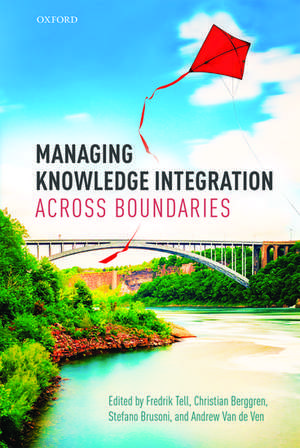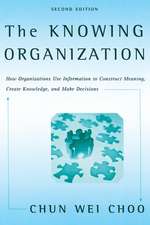Managing Knowledge Integration Across Boundaries
Editat de Fredrik Tell Autor Christian Berggren, Stefano Brusoni, Andrew Van de Venen Limba Engleză Hardback – 15 dec 2016
Preț: 565.13 lei
Preț vechi: 808.75 lei
-30% Nou
Puncte Express: 848
Preț estimativ în valută:
108.15€ • 112.49$ • 89.29£
108.15€ • 112.49$ • 89.29£
Carte tipărită la comandă
Livrare economică 01-07 aprilie
Preluare comenzi: 021 569.72.76
Specificații
ISBN-13: 9780198785972
ISBN-10: 0198785976
Pagini: 326
Dimensiuni: 174 x 240 x 23 mm
Greutate: 0.62 kg
Editura: OUP OXFORD
Colecția OUP Oxford
Locul publicării:Oxford, United Kingdom
ISBN-10: 0198785976
Pagini: 326
Dimensiuni: 174 x 240 x 23 mm
Greutate: 0.62 kg
Editura: OUP OXFORD
Colecția OUP Oxford
Locul publicării:Oxford, United Kingdom
Recenzii
While it is popular to say that we live in an increasingly 'boundary-less' world, in reality, people in organizations face numerous boundaries in their everyday workgeographic, functional, divisional, cultural, intellectual, etc. This book offers both theoretical and practical insights into how people can manage across or through these boundaries in order to integrate knowledge.
In the age of open innovation, it is clearer than ever that no firm is an 'island'. However, that important truth does not negate another fundamental property that boundarieswhether between firms, work groups, or national bordershave consequences for the flow of knowledge. This volume by Tell, Berggren, Brusoni, and Van de Ven provide a conceptually sophisticated and empirically rich account of these tensions and challenges.
Knowledge may be power, but fragmented knowledge can be disempowering. Finding ways to integrate increasingly specialized, distributed and incomplete knowledge across boundaries is one of the most pressing issues in late modern societieshardly any social or economic problem is effectively addressed unless diverse streams of knowledge are systematically shared and integrated. This is the best book I have seen on this important topic. There is much to admire in it: the diversity of perspectives, the empirical richness, and the theoretical robustness are all evident. It breaks new ground in how we understand knowledge integration.
In the age of open innovation, it is clearer than ever that no firm is an 'island'. However, that important truth does not negate another fundamental property that boundarieswhether between firms, work groups, or national bordershave consequences for the flow of knowledge. This volume by Tell, Berggren, Brusoni, and Van de Ven provide a conceptually sophisticated and empirically rich account of these tensions and challenges.
Knowledge may be power, but fragmented knowledge can be disempowering. Finding ways to integrate increasingly specialized, distributed and incomplete knowledge across boundaries is one of the most pressing issues in late modern societieshardly any social or economic problem is effectively addressed unless diverse streams of knowledge are systematically shared and integrated. This is the best book I have seen on this important topic. There is much to admire in it: the diversity of perspectives, the empirical richness, and the theoretical robustness are all evident. It breaks new ground in how we understand knowledge integration.
Notă biografică
Fredrik Tell is Professor in Business Administration at Linköping University and Director of the KITE Research Group. His research revolves around implications of innovation and knowledge integration for firm strategies, competitiveness and organization. His research has been presented as book chapters in a number of edited volumes and as research articles in journals such as Creativity and Innovation Management, Industrial and Corporate Change, and International Journal of Project Management to name a few. He currently serves as one of the editors of Industrial and Corporate Change (UK & Scandinavia).Christian Berggren is Professor in Industrial Management at Linköping University and served as director for the KITE program during her first four years. He has been involved in international debates regarding industry, knowledge and innovation since the early 1990s, critiquing lean production-rhetoric, as well as disruptive innovation theories, and proposing creative accumulation as an alternative. Currently he focuses on studies of innovators in emerging economies, and the technology and policy challenges involved in sustainability transitions, in particular in the automotive industry. His work has appeared in several books and various journals like Research Policy, Industrial and Corporate Change, Sloan Management Review, World Development, Ecological Economics, Journal of Business Research amoung others.Stefano Brusoni is Professor of Technology and Innovation Management at the Swiss Federal Institute of Technology (ETH Zürich). His core research lies in understanding how organizations and individual combine and integrate dispersed knowledge in order to become routinely innovative. His work has appeared in various journals such as Administrative Science Quarterly, Organization Science, Research Policy, Strategic Management Journal, Organization Studies, Industrial and Corporate Change. He is Editor (Continental Europe) of Industrial and Corporate Change, and member of the Editorial Board of Organization Science, Strategic Management Journal, and Academy of Management Discoveries. He is also Chair of the Knowledge and Innovation IG of the Strategic Management Society.Andrew Van de Ven is Vernon H. Heath Professor of Organizational Innovation and Change in the Carlson School of the University of Minnesota. Van de Ven's research over the years has dealt with the Nominal Group brainstorming technique, program planning, organization design, processes of organizational innovation and change, and methods of engaged scholarship. He is co-author of 12 books, including: The Innovation Journey (1999, 2008), Organization Change and Innovation Processes (2000), Handbook of Organizational Change and Innovation (2004), and Engaged Scholarship (2007) all with Oxford University Press. During 2000-2001 Van de Ven was President of the Academy of Management. He currently is serving as founding editor of the Academy of Management Discoveries.











